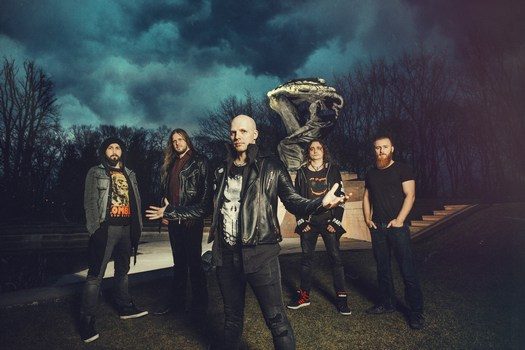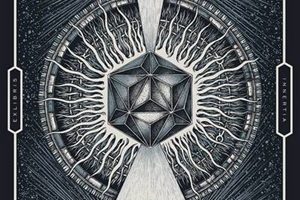Exlibris – Painting Dynamic Scenes
Friday, 3rd August 2018
Together since 2003, Exlibris hail from Poland – and push a sound that combines traditional heavy metal, power, and progressive shades with orchestration/symphonic elements. The diversity aids their appeal – although domestically different than the extreme or stoner/doom bands that seem to gain the lion’s share of international attention these days. Their fourth studio album Innertia keeps things melodic as well as energetic, bringing to mind names of Avantasia, Kamelot, and Stratovarius when taking in songs such as “Harmony of the Spheres” and “Thunderbird”.
Fielding a series of questions, keyboardist Piotr Sikora let us in on the discography of the band, their recent lineup additions including their new Finnish vocalist, how it feels to be a DIY band currently after being on a label, and the challenges that face them going forward.
Dead Rhetoric: What are some of your childhood memories relating to the discovery of music – and eventually moving into heavy metal? At what point did you decide you wanted to pick up an instrument and perform – eventually playing in bands?
Piotr Sikora: I don’t really come from a musical background, my parents never played any instruments, never had a big record collection or anything like that. My dad has always been into classic rock and prog but he’d only blast some Led Zeppelin on the home stereo or an ELP live album in his car on rare occasion. Despite that, I guess I was always drawn to music for some reason. Some of my very first memories are about singing along to the radio and then trying to sing those songs while jamming on an imaginary guitar that was actually a tennis racket, in a made-up language that was supposed to sound like English. First thing I remember buying for myself – besides candy and soda – was a bootleg Michael Jackson cassette when I was about 7. In the mid-90s I became interested in electronic (music) and I listened a lot to stuff like Prodigy – they were becoming huge at the time but I wanted something very different to what most kids were listening to. So I guess that’s what made me curious, like… you know… what else is there that I don’t know about? I suppose I got a little lucky too because music classes in my elementary school were actually interesting and fun – not a very common thing in Polish schools. So instead of getting bored out of my mind for a couple of hours a week, I learned to read music before I actually started learning an instrument.
When I was 13, I saw an ad for a “keyboard camp” happening over the winter break and I told my parents I wanted to do that – so they signed me up. Two weeks out of town with music lessons for beginners happening every day – turned out I was a quick learner and I enjoyed it a lot so I got my own first keyboard soon after.
I started writing and recording my own music in high school. At that point it was mostly various forms of electronica, which may not have been the most interesting thing in terms of melody and harmony, but it was my way into synths and sound design, as well as the basics of music production. About the same time, I began discovering metal. I remember asking friends who were into heavy and power metal to lend me some of their favorite CDs getting Iron Maiden’s The Number Of The Beast and Helloween’s Keeper 2 that way… which turned me away from the genre for quite a while because I really didn’t like those albums back then and I guess I still don’t. Don’t get me wrong – I think Maiden has some amazing stuff in their catalog but Number must be my least favorite album from them – and I enjoy the 90’s Helloween much more than their early stuff. I did like Nightwish though, primarily because of the way they used keyboards in their music. File sharing over the internet had just become a big thing so I used that to discover new bands that none of the other kids at school have even heard of – that’s how I found Symphony X and Kamelot – some of my favorite bands in the power and prog metal genres.
Wow, that was a longer story than I expected it to be… Anyway, the last months of high school I wrote a couple heavy metal songs and decided it was time to find some people to play with. I found a guitarist who already had a band and wanted to change their sound towards a “Judas Priest meets Nightwish or something” kinda sound. That’s how Exlibris started. Both those songs I wrote made it to our first album.
Dead Rhetoric: Exlibris began in 2003 – can you tell us about the early formation days of the group? Did you have a struggle developing a proper lineup, and did you know straight away the style of power metal you wanted to play?
Sikora: The original Exlibris line-up lasted for about a year. We were a bunch of 20 year-olds coming from very different musical backgrounds and just learning what being in a band was. At first we’d just jam around and see what comes out but Daniel and I took over most of the writing pretty soon and the Exlibris sound really started to develop from there. We recorded our first album after only two years of the band’s existence. Not our greatest idea, because we really didn’t know what we were doing back then. After that the line-up changed quite a bit for a while. People would come, we’d start working with a new line-up but then they’d quit before we could get anything done. I guess that’s what people do in their twenties. Anyway – it took quite a while before we met people who were into it as much as Daniel and I were, but we never stopped writing music. Things really changed with the recording and release of Humagination.
Dead Rhetoric: How would you describe the evolution of Exlibris through your three previous full-lengths? What do you consider some of the strengths of each record, and what (if anything) do you think could have been better or improved upon?
Sikora: Well, as I mentioned we really had no idea what were doing with the first album. The songs weren’t bad at all but the band’s performance and the album’s production were a disaster. Obviously at the time it felt amazing to do it. Anyway – that’s why we consider Humagination our first real record. Even though it took a while to complete – and we actually changed lead singers during the recording – it turned out just right, got us signed to a label and really put us on the map – in Poland anyway. While Humagination contained some songs dating back as far as 2006, Aftereal came out barely a year later and it was all new material written and recorded within that year. It was our label’s idea to do it so soon, I guess it was a little risky but I’m still happy how it turned out. Compared to Humagination, the songs are a little more complex, there’s some heavier stuff and the album is quite varied despite being written in such a short time. The only thing I’m not entirely happy with is the album’s mastering. It’s very loud and bright and while it might make a good first impression, it can be fatiguing in the long run, especially when listening with headphones – but that’s pretty much the only thing I could complain about.
Dead Rhetoric: Why was there a seven-year lapse between Skyward and Humagination? Do you believe this killed the upward climb and momentum for establishing Exlibris beyond Poland into the international market?
Sikora: Not at all. Mostly because Skyward was not an album that could give us that momentum in the first place. Instead we took the time to learn and returned as a much more mature band with an album that was actually worth the great reception it got – even if ultimately it only reached a limited audience.
Dead Rhetoric: Your latest album Innertia sees the band going back to a DIY, self-release for your fourth full-length. What can you tell us regarding the songwriting and recording sessions? Were there any specific challenges, surprises, or obstacles that came up and had to be dealt with – and where do you see this effort sitting against the other records?
Sikora: The writing of Innertia began right after our lead singer Kris quit the band to focus on his other band Nocny Kochanek, which was just about to become the next big thing in the Polish music scene. So I guess the biggest obstacle was writing without a specific singer in mind. When we started working with Riku Turunen almost a year later, some of the songs that made it to the album were already completed. Changing the lead singer is never easy, especially if the new voice is very different. I’m talking more about the audience’s reception of the new material than the work itself. We expected some old fans would have a hard time adjusting to the new sound but luckily there wasn’t very much of that – the album’s reception so far is overwhelmingly positive. I truly believe it’s our best album yet, in every way.
We decided to release the album on our own because honestly we were a little disappointed with where releasing two albums on a label got us. Now I’m not saying they didn’t do their job or that it didn’t get us anywhere – on the contrary, I think it gave us a pretty good start. It’s just that we watched and learned and decided we can do most of the work just as well ourselves – maybe even better in some terms. We don’t really care if we profit from the album’s release in financial terms, which lets us do things that a label wouldn’t. Obviously it requires some investments and dedicating much more time to handle everything ourselves but it in the end it proved very rewarding. We have a much closer look at who our fans are, we’re reaching a lot of new people, getting a lot of feedback and it feels great.
Dead Rhetoric: How would you describe the lyrical content and themes on this record? Which comes first for you in development – the storylines and melodies, or the musical foundation?
Sikora: Melodies can come at different stages of writing. Sometimes a song is based on a vocal melody and arranged around it, other times the lead melody is the very last thing written – and obviously it can be anything in between. Most of the time lyrics come last though.
I wouldn’t say there are any storylines in my lyrics. It’s more like painting a picture with words and feelings. A song is like a dynamic scene. I hope this makes some sense. Innertia is an album about the universe and the powers clashing within it, making it work the way it does. I think in a way it’s also an album about hope.
Photos courtesy of Marek Mosinski
Pages: 1 2























